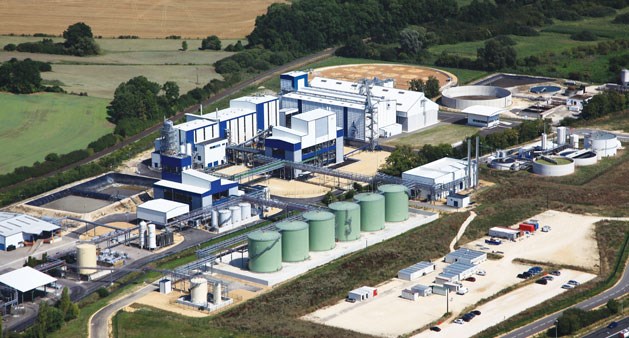Baleycourt is one of the 12 businesses that come under INEOS Enterprises’ umbrella. It is a small site, about the size of 20 football pitches, but its contribution to INEOS’ success should not be underestimated.
INEOS Enterprises will be fielding another new product this year – food grade rapeseed oil.
It will be the first time that INEOS has ever ventured into the food ingredients market, but by the end of 2014 it will be producing 15,000 tons of rapeseed oil at its site at Baleycourt, France.
Only time will tell whether it will be a wise investment but Ashley Reed, Chief Executive Officer of INEOS Enterprises, and Chief Operating Officer Steve Dossett, who manages the business, are confident.
“It is a new departure for us but rapeseed oil is becoming increasingly popular, mainly for its healthy properties and price advantage versus olive oil,” said Ashley.
Production of rapeseed oil, which is a rich source of vitamin E and contains half the saturated fat of olive oil, will also help to ensure that the site – in the heart of France’s second largest vegetable oil producing region – remains competitive.
For years Baleycourt had been producing tons of biodiesel for French supermarkets and oil companies like Total.
In 2008 INEOS Enterprises further strengthened Baleycourt’s position when it set up an €80 million joint venture – known as INEOS Champlor – with French farming co-operative SICLAE and oil seed crushing group C.Thywissen, which led to the opening of a second biodiesel unit and rapeseed crusher and oil refining plant.
“The investment was principally driven by the French government which was promoting significant levels of biofuel blending ahead of EU legislation,” said Ashley. “Each of the fuel markets (diesel and gasoline) had individual incorporation targets with severe financial penalties for the blender if they failed meet the obligation. That meant we should have had a guaranteed market.”
It also meant INEOS could crush locally-grown rapeseed itself instead of buying it as rape oil from Germany, where previously it had been transported for crushing.
The investment made financial sense and the partnership worked beautifully. INEOS bought in the rapeseed at a competitive price and crushed it, making thousands of tons of renewable fuel for a market that wanted it. As a bonus, the by-product was rapeseed meal, which was used as a GM-free protein animal feed for pigs.
At its peak Baleycourt was producing 140,000 tons of biofuel and 180,000 tons of rapemeal every year.
But then the wind started to change.
In 2010 the EU introduced ‘double count’ legislation which encouraged fuel producers to blend waste feedstocks such as used cooking oil and tallow.
By 2011 – with no cap on the product – the international oil trading hub, ARA, began saturating the French market with this form of fuel, materially impacting on demand for ‘single count’ rape oil derived product. Baleycourt production volumes slumped. Eventually imports into France were limited.
The domestic producers did regain market share but it had altered the market dynamics significantly and French government incentives were also about to dwindle.
The following year the EU Commission made a significant about turn on biofuels with a proposal to limit the quantity of biofuels made from crops to 5%.
Then last year further EU legislation was imposed.
In short, the EU had lost its appetite for crop-based biofuels.
“There is still much debate within the EU institutions, including what is a crop, so it is not clear exactly how this will play out over the next few years,” said Ashley. “But it is highly unlikely there will be much, if any, growth in the current EU average blending levels of biodiesel made from crops.”
INEOS decided it was time to take back control. To become the master of its own destiny.
At the end of last year it negotiated down the JV’s uneconomic debt with the banks, bought out its JV partners, agreed a five-year, improved deal with farmers for their rapeseed and restructured the Baleycourt business.
“We had been thinking about using the extra capacity to produce rapeseed oil instead of biofuels for a while but we needed the agreement of all parties,” said Steve. “The JV could not service its debts to its lenders and had been heading towards bankruptcy since the end of 2010. Failing was an option but now INEOS has a future in the oilseeds and biodiesel world, whilst still retaining the strategic supply for local seed from the French co-operatives. This new project is a toe in the water. We know there is already a very large oil market but we are confident.”
The seeds of that new venture are now being sewn in the fields that surround the 25-hectare site near Verdun.
But Baleycourt, which employs 150 people and turns over 250 million Euros every year, is not just about biofuels.
This small French site has also been producing high quality plasticisers from alcohols and acids for more than 40 years.
And business is booming thanks to the development of INEOS’ phthalates-free CEREPLAS™ Esters which are now used to make PVC cling film and food bags, car dashboards, vinyl flooring, and tubes and bags for the medical industry.
Over the past five years three new grades – terephthalates, trimellitates and sebacates – have been launched on the market leading to more than 20% increase in sales volume.
“This growth has been driven by matching market demand and being proactive on customers’ trends,” said Steve.
Phthalates help to soften and make plastic more flexible and harder to break, but their use come under increasing scrutiny due to concerns about potential health risks.
“What INEOS did – in the face of those concerns – was develop an alternative, phthalate-free ester which does the same thing,” said Steve. “Some of our competitors do still make phthalates as well as non phthalate products but we made the decision – and it was important to us – to make the site 100% phthalate free. Even though that limited our sales opportunities, it meant we could promise our customers that we would not, even by accident, supply them products containing phthalates.”
Baleycourt, which sees more than 700 000 tons of various products transported in and out of the site each year, also produces esters for the lubricants market.
“The future of the esters business will be to continue to grow significantly by providing tailor-made, smart solutions,” said Ashley.
That will be done by keeping a close, watchful eye on the ever-changing market and coming up with innovative products to meet INEOS’ customers’ needs.
“INEOS Enterprises is now recognised as a key supplier of esters in Europe which is a significant achievement, when you consider that esters’ customers are historically reluctant to change because of the lengthy approval processes imposed on them by their downstream customers,” said Ashley.



















